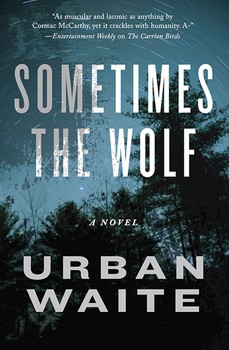You have no items in your cart. Want to get some nice things?
Go shoppingUrban Waite is the author of the critically acclaimed novels The Carrion Birds and The Terror of Living. A recipient of Esquire Magazine’s best book of the year as well as a finalist for the New Mexico and Arizona book award, his writing has been translated into nine languages and is sold worldwide. We asked him a few questions about his third novel, Sometimes the Wolf, released in the UK last week.

Litro: Did you always intend to write a sequel to The Terror of Living? At what point did the sequel start to emerge?
Urban: I never intended to write a sequel. And I don’t think of Sometimes the Wolf as much of a sequel. It requires no prior knowledge of Terror and I think that’s important for any book. More than anything, it’s a book about fathers and sons, and the legacies they leave each other. Both up and down the tree. So, I guess in that way, everything I write is sort of a sequel. Maybe one of these days I’ll stray a little bit. But I’m not there yet and I still have a lot more to say about fathers and sons.
Litro: Sometimes the Wolf explores the father-son relationship between Bobby and Patrick Drake. What made you want to explore this dynamic?
Urban: The people that know my dad and I ask this question a lot. We actually like each other. Unlike the characters in my novel, he never went to prison and ruined my life. And for the most part (except for that summer I was grounded) we’ve been on pretty good terms. So I guess the best answer to this is like anything else in fiction: we explore what we don’t know through writing. Sorry, Hemingway.
Litro: Where did the wolf subplot (and the title of the book) come from?
Urban: Down by Carlsbad, New Mexico I saw a coyote tugging at the carcass of a deer that had caught itself on some cattle wire in the night. It was just a short, passing image as I drove by, but it stayed with me. And so when I started to think about the Northwest and the mountains this image came to mind. And well, from there it all kind of just fell into place. Wolf as metaphor and that sort of thing, because out here it’s a big issue.
The title was pure genius on my editor’s part. I had something horrible, which won’t be mentioned here (or ever, except after a couple beers, and even then only maybe). My editor was reading through Blood Meridian by Cormac McCarthy and came across a line in there that I’ll paraphrase for you. “When the lamb is lost in the mountains, the lamb will cry, sometimes comes the mother, sometimes the wolf.”
Litro: Do you think you’ll ever revisit these characters again? Or is this the end for Drake?
Urban: I’ve been thinking more and more about this lately. I always think it’s over when I get to the end of a novel and then this idea of an ending sort of festers there as I wonder what happens to these people after the final page is read.
Lately, I’ve been thinking that Sometimes the Wolf is the middle of something. Like Terror, it takes a moment in a person’s life and it analyzes the what could be, and the what is of the moment. I think there’s more there to look at. More that I can explore, and want to explore down the line.
Litro: What can you tell us about the film adaptations of your first two books?
Urban: I’ve had nothing but a good experience with the film adaptations. Both of my previous books have had their rights sold and they both currently have scripts and some form of funding. But to be truthful this is all my vague understanding. I mostly keep out of it. As a writer I work on my own and I like it that way. I am baffled by anything that resembles a workplace, or requires the input of more than the voices in my head. All the working parts of making a film seem quite foreign to me. And I imagine it must be like trying to make your voice heard in a room where there are a thousand other voices vying for attention. Still, I always hope for good things.
 Litro: If you had to give one piece of advice to someone wanting to write crime thrillers, what would it be?
Litro: If you had to give one piece of advice to someone wanting to write crime thrillers, what would it be?
Urban: Bad guys are people, too.
There are a lot of really bad, bad guys out there. And when I say bad, bad guy I mean they do not seem like believable characters. And if the idea in writing is to create characters that the reader can identify with in some small way, then my goal is always to create characters that are only a few shades of gray from being good, decent characters. In life and in fiction the beginning of something horrible often comes down to a choice as simple as getting behind the wheel after a beer or two. Meaning: the distinction between what is good and what is bad is usually something very small.
Litro: And finally… what can we expect to see from you next?
Urban: I’m working on a novel that follows around an Olympic boxer in the year after he has come back from the Olympics. I wasn’t really sure what I had when I started but I’ve found it to be pretty fascinating. The whole idea of family amidst fame and celebrity, as well as the hopes those in the community put on someone who is, in their minds, bound for greatness.
I’ve finished a draft and I’m tailoring it now, trying to make it better with each pass. It’s always an adventure and one that I think I might just pull off.
You can read more about Urban Waite’s forthcoming fourth novel in his essay ‘Approaching the Ring‘.
We have three copies of Sometimes The Wolf to give away to our readers. To enter, just follow us and leave us a message on Twitter @litromagazine telling us why you’d like to read the book, including the hashtag #SometimesTheWolf. Three winners will be chosen at random on Monday 13th April, 2015. Open to UK residents only.
Sometimes the Wolf is out now in the UK from Simon & Schuster.





